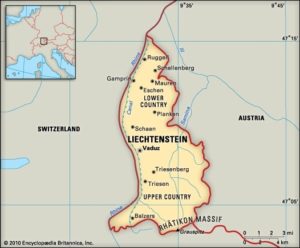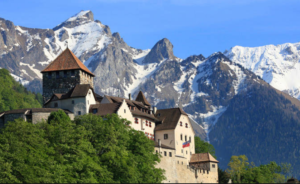 In the spring of 1938, just after the annexation of Austria into Nazi Germany, eighty-four-year-old Prince Franz I abdicated, naming his thirty-one-year-old third cousin, Prince Franz Joseph the II, as his successor.
In the spring of 1938, just after the annexation of Austria into Nazi Germany, eighty-four-year-old Prince Franz I abdicated, naming his thirty-one-year-old third cousin, Prince Franz Joseph the II, as his successor.
While Prince Franz I claimed that old age was his reason for abdicating, it is believed that he had no desire to be on the throne if Germany decided to attack its new neighbour, Liechtenstein. Also his wife, whom he married in 1929, was a wealthy Jewish woman from Vienna. After the Anschluss, Liechtenstein no longer had Austria at its border, now it had Nazi Germany.
 Prince Franz Josef II became the first Prince of Liechtenstein to take up permanent residence in Liechtenstein. About 400 Jewish refugees fled during the Nazi era to find safety in the neutral Alpine principality during World War II, 235 were accepted but 165 were turned back. In addition, the principality allowed 144 Jews to become citizens in return for high fees during the Nazi era. Most of those new citizens never lived in Liechtenstein but chose another country. The fact of being a Liechtensteiner made it easier for them to establish themselves in a Western country.
Prince Franz Josef II became the first Prince of Liechtenstein to take up permanent residence in Liechtenstein. About 400 Jewish refugees fled during the Nazi era to find safety in the neutral Alpine principality during World War II, 235 were accepted but 165 were turned back. In addition, the principality allowed 144 Jews to become citizens in return for high fees during the Nazi era. Most of those new citizens never lived in Liechtenstein but chose another country. The fact of being a Liechtensteiner made it easier for them to establish themselves in a Western country.
Liechtenstein accepted mainly rich Jews, who were expected to spend their money in the country or who created jobs by establishing companies in the principality. Like most other Western and overseas countries, Liechtenstein tightened its immigration laws in 1938. It did not employ slave workers and no assets belonging to Jewish families were confiscated but the country’s refugee policy was ambivalent.
The tiny Jewish community in the Principality, consists of fewer than 20 people, and does not maintain any formal institutions.